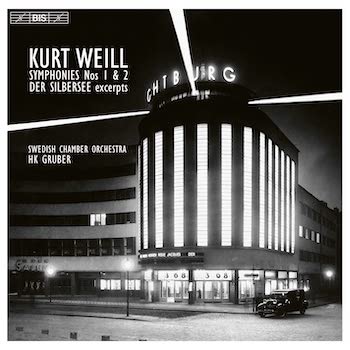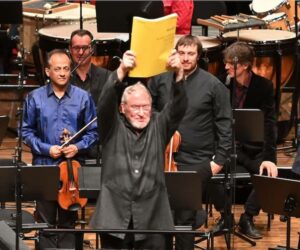Classical Album Review: HK Gruber conducts Kurt Weill
By Jonathan Blumhofer
This gripping and engaging release from HK Gruber and the Swedish Chamber Orchestra manages to thread the needle between the various strands of Kurt Weill’s musical personality.
 The last year has been a notably good one for fans of Kurt Weill’s oft-neglected Symphony No. 2. A pair of strong recordings (one of which was reviewed here) emerged in 2022. Now comes a third, courtesy of the Austrian composer/conductor/all-around-musical-mensch HK Gruber and the Swedish Chamber Orchestra (SCO), which pairs the piece with Weill’s Symphony No. 1 and excerpts from Der Silbersee.
The last year has been a notably good one for fans of Kurt Weill’s oft-neglected Symphony No. 2. A pair of strong recordings (one of which was reviewed here) emerged in 2022. Now comes a third, courtesy of the Austrian composer/conductor/all-around-musical-mensch HK Gruber and the Swedish Chamber Orchestra (SCO), which pairs the piece with Weill’s Symphony No. 1 and excerpts from Der Silbersee.
It’s a gripping and engaging release that manages to thread the needle between the various strands of Weill’s musical personality: the enfant-terrible of ‘20s Weimar Germany, the acerbic theater composer, and the mature symphonist of the ‘30s. Across all three, a distinctive voice emerges.
The Symphony No. 1, written when Weill was a student in 1921, boasts something of a kitchen-sink aspect. Though it lasts less than twenty minutes, the piece feels longer, in part thanks to its diffuse structure and tendency to linger over ideas best left by the wayside.
Yet Weill’s ear for the direct thematic gesture is keen and, for all the Symphony’s chromatic vigor and architectural jerkiness, a strongly lyrical component dominates his writing in it. The latter helps overcome the larger work’s structural discursions; expressively, this is music of heart and passion.
Those last qualities also apply to the Symphony No. 2, which Weill completed in 1934 after fleeing Nazi Germany. Cast in three movements, its arguments are often bold and rhythmic, though the central movement also features some soaring, cabaret-worthy tunes.
While the score’s overriding affect is more subdued than the First Symphony’s, there’s a toughness and defiance to Weill’s writing here that one doesn’t always associate with the composer. That quality emerges, quite brilliantly, in this recording of the finale’s coda, which comes across as both exuberant and totally unbowed.

HK Gruber performs a new version of Die sieben Todsünden. Photo: Kurt Weill Foundation
Before that comes no shortage of cheek and swagger – the first movement’s counterpoint dances playfully – as well as diabolical energy. At the heart of the proceedings lies an account of the Largo that astonishes for its blend of sheer power and heartfelt songfulness.
Setting the stage for all of this are three selections from Der Silbersee, Weill’s last Weimar-era theater piece (it was banned by the Nazis in March 1933, after sixteen performances). Two of them – “Der Bäcker backt ums Morgenrot” and “Was zahlen Sie für einen Rat” – are sung with fantastic style by Gruber. He also leads the SCO in a vigorous account of the Overture and provides a spoken introduction to “Was zahlen Sie,” locating some of its timeless themes (particularly greed and wealth).
The end result, then, is a disc that’s at once musically and morally compelling, not to mention brilliantly played. It’s also flawlessly engineered. Highly recommended.
Jonathan Blumhofer is a composer and violist who has been active in the greater Boston area since 2004. His music has received numerous awards and been performed by various ensembles, including the American Composers Orchestra, Kiev Philharmonic, Camerata Chicago, Xanthos Ensemble, and Juventas New Music Group. Since receiving his doctorate from Boston University in 2010, Jon has taught at Clark University, Worcester Polytechnic Institute, and online for the University of Phoenix, in addition to writing music criticism for the Worcester Telegram & Gazette.
